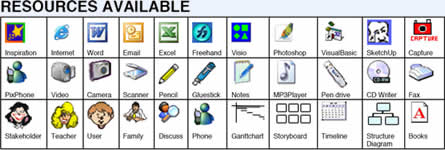Making programmes fun
ICT is by nature a subject that is relevant, creative and fun. The challenge is to keep the programme fun when adding in the requirement to undertake and document technological practice. Most students just want to make things on the computer and don't like to plan or develop the brief.

Year 10 student Paul more than met the challenge of being more creative in his presentation on computer worms, which starts with an animation of a battle scene as worms invaded a computer.
(See case study outcomes)
View PowerPoint presentation
Note that this large file is
not designed
for use as web-based media.
Students were encouraged to be creative in designing and developing their outcomes – the outcomes pages of the related ICT Case Studies illustrate this – see BP628, BP629 and BP630.
At Katikati, students were encouraged to be more creative in their evidence - by replacing paper-based documentation with digital, and in their approach to their visual diary entries.
At Hillcrest, handouts were redesigned to appeal more to their teenage recipients. Other resources were made more user-friendly and interactive. Commercially produced resources were introduced to provide teachers with more time to focus on individual needs and, where required to develop additional resources of their own.
Cluster members agree that one of the greatest benefits of their work has been the injection of fresh ideas into their teaching practice. Classroom visits by Hugh and Cliff and their feedback were particularly useful. The facilitators challenged the teachers to re-evaluate the way they interacted with their students. Rather than being, as Hugh Derham puts it, "a sage on the stage", teachers were challenged to be more creative in their approach and come up with new ways of teaching.
Hugh encouraged the teachers to be more proactive with their students. Rather than standing back in the early stages of a project when students are identifying issues and thinking about shareholders, he encouraged the teachers to interact more by asking questions.

The range of resources available for Jenny's Year 11 ICT Programming Project students, as presented in their Assessment Requirements pdf (296kb).
Classroom outcomes for 2006
Hugh Derham:
"If students are involved with what they are doing, then they will have fun with it. We need to create more student ownership and get a more student centred syllabus. If the student decides what they want to do and takes ownership then they will want to do it - and they will have fun.
"And in terms of creativity, you can't just suddenly get students to Year 13 and then simply switch on the creative juices - its something that needs to be developed all through the schooling by changing students' attitudes from much earlier on."
Malcolm and Steve ensured that fun, creativity and variety were a continuous feature throughout the year for the 2006 Year 10 class, so students were enthusiastic and well prepared for senior ICT courses. Four carefully planned independent modules were offered, progressively designing and producing a CD cover, a kiosk PowerPoint presentation, and a website, culminating in the class dividing into groups to focus on the final Digital Creativity project. "I could see that the students enjoyed the course. They liked the variety in the project work and the higher creative element in it." See Case Study BP628: A junior ICT programme.
For her Year 11 class, Jenny ensured the engagement of students by choosing real-life task for their major project they could all intimately relate to and one where the users as major stakeholders were often younger than them - developing a computer program to meet a specific learning need. Preparation and skill development earlier in the year were linked to a 'fun' aspect of computing - video games. See Case Study BP629: ICT Programming.
For his Year 12 class, Malcolm ensured students had ownership and maximum creative control in their CD-ROM project, by being given the opportunity to identify their own issue and having a wide choice of media/programs they could use for the project and for documentation. The outcomes were of such a high standard and so varied in approach and content they are testament to the fact that his students were engaged in a project in which they were genuinely inspired. See Case Study BP630: Multimedia CD-ROMs.
